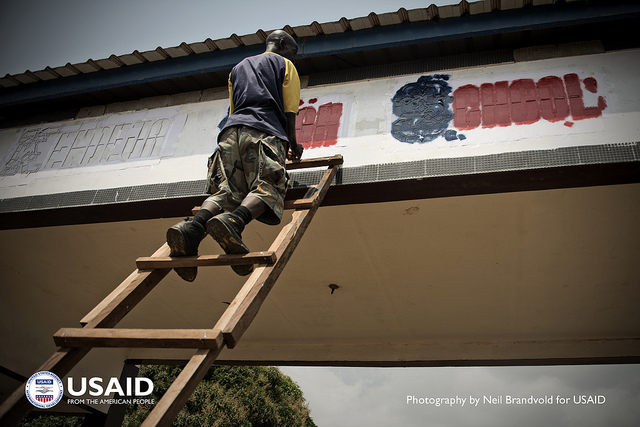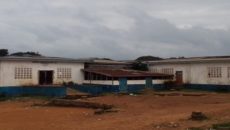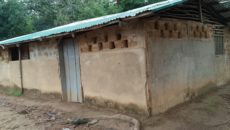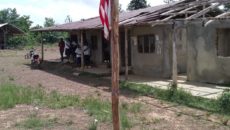The Ministry of Education has announced the closure of primary and secondary schools in the country by July 31, 2015. This decision is contrary to the recommendation of the plenary of the House of Representatives. When Education Minister George Werner appeared before the representatives, they directed him to abandon his proposal to close schools on June 30. He made the disclosure yesterday at the Minister of Information regular press briefing in Monrovia. Below is the full detail of the Minister’s plan of action. It does not address the main concerns of parents that they had already paid for the school year which will be truncated, although it does say WAEC fees will be reimbursed.
Policy to Improve Schooling after Ebola
Background
The Government of Liberia school year has traditionally run on a SeptemberÂ-June cycle. With the advent of Ebola, schools were officially closed in September 2014. This prudent measure was pivotal in containing exposure to, and spread of Ebola, amongst children and their families. As Ebola became contained, and with a learning deficit of 6 months per pupil, the Ministry of Education (MoE) prioritized getting children back into school. MoE announced the reopening of schools in February 2015, and a resetting of the school calendar to a March-ÂNovember cycle.
The MoE has a mandate to develop, promote and implement educational policies and create the necessary institutional framework that will provide universal education for all Liberians; and thus enable government to provide and support sustained human resources development in all its aspects of human endeavor. We must intensify the process of transformation by developing a highly educated and skilled labor force. Improving education is therefore crucial for the country, and crucial for every child – so that each child can fulfill his or her potential.
During our confirmation hearing before the Senate Committee on Education and at a Cabinet meeting afterwards, the MoE leadership team presented a comprehensive vision to optimize the gains we have made in the educational system since the end of the Civil War. We said then, and would like to repeat here, that our Government’s mandate to progress from “mess†to “best†demands improving learning conditions and outcomes in Early Childhood Development, Basic and Secondary Education. This requires addressing the 6–month learning deficit headÂon with both the optimal school calendar and the resources needed to support learning.
The grievous direct and continuing indirect hardship imposed by Ebola has resulted in close to nil in learning outcomes for children between September and June 2015. In addition, the rainy season will significantly reduce pupil and teacher attendance, particularly in rural areas, in the coming months. Seeking to achieve one school years’ worth of learning in the remaining period running till November 2015 is an unrealistic burden to expect either teachers or pupils to shoulder. All students need to master the content and skills, which will allow them to excel in future years. Moreover, all students in Grades 9 and 12 need to be fully prepared for WAEC Exams, which had been set for October 2015. In the past five (5) years our students have received poor scores in WAEC Exams; after 6 months out of school, it is not likely that students will achieve better results in the WAEC Exams, which had been set for October 2015.
The further risk is that desired learning outcomes in future years are lowered irrecoverably to cater for the shortÂterm learning deficit.
We know that the scale of the challenges we face is monumental. We spent last week travelling through several counties, listening to students, teachers, parents, school boards, and community members. The listening tour was disheartening, to say the least. In many places, the system is not merely a mess; the system has collapsed To illustrate, In Wotoken, Sinoe County, because of appalling conditions in the only public school there, school where, when the children left, goats came in and left their waste; no chairs, so parents stopped sending their children and moved them to a church building. With the onset of the rainy season and thunder storms, the roof caved in and the parents withdrew their children; In Grand Kru, there were no Science and Math teachers in any of the three high schools: PG Wollor, Barclayville Central High, and Sasstown High.
The structural integrity of Cape Palmas High School has been badly compromised, so much so that students have been evacuated to a nearby makeshift facility in which there are no toilets. In Wleboken, River Gee, students have nowhere to go when it rains. There are too many schools with no latrines, no water, no roofs across the country.
Speaking to a group of students, 1 in 3 were willing to report, publicly, that they had been directly asked for bribes by teachers or teaching assistants.
All of this means that students aren’t able to learn, and aren’t able to reach their full potential. Liberians want and deserve better. Students and teachers want books, instructional materials, and support.
MoE is therefore resetting the school year to the original cycle, and to rapidly implement improvements during a shortened school break. This policy will provide a solid foundation for full recovery of teaching and learning: students will have more time in school to learn, and teachers will be better prepared and better supported. Furthermore, the rainy season, a real challenge for poor, rural children and their families, will not disrupt schooling year on year.
School calendar
The following are changes to the school calendar, with adjustments to promotions and WAEC dates.
- The school calendar for ECD, Basic and Secondary Schools will revert to the normal cycle, with the 2015 condensed school year concluding on July 31, 2015.  2015/2016 school year: September 2015 – July 2016 (for a total of 210 school days for Grades 1 Â12 and 220 school days for preÂschool).  Henceforth, All ECD, Basic and Secondary Schools in the Republic of Liberia will close on July 31, 2015, for this current school calendar. Schools will reÂopen on September 7, 2015.  Grades 1 – 12 will close on July 12, 2016, while Pre – school will close on August 12, 2016.
- For the 2015/2016 school year, students will enrol in the grade appropriate to their learning to date.  Students in Grades 1– 8, 10 and 11 may promoted on the basis of attainment, as judged by their school: if they have met the learning objectives, then they will be promoted.  Students who have not met the learning objectives will not be promoted; they will have a full cycle to learn what they need to for the school year just passed.  Students who were enrolled in Grades 9 and 12 during the 2015 condensed school year will continue in that grade and be properly prepared for 2016 exams.
- There will be no WASSCE or WAEC Exams in 2015 for schoolÂbased candidates. Â Examinations will be held in May 2016. Students will be credited for fees already paid to WAEC.
Improving Schooling
Changes to the school calendar go handÂinÂhand with work being done to rapidly improve teaching and curricula. Three measures are especially important. Â
- The Ministry is in the process of distributing new textbooks, supplementary workbooks and instructional materials to schools. During the AugustÂSeptember break, teachers will be provided with training on using these. This training will take into account the effects of the 2015 condensed school year. Â
- During the second half of the 2015/2016 school year, Grade 12 students will be taught a curriculum designed to consolidate their learning, maximize their performance on WAEC, and also teach appropriate life skills and career skills. Â
- Science clubs will be run from October 2015 for all Grade 9 and 12 students. These will provide excellent teaching in a range of subjects, consolidating students’ learning and preparing them for WAEC.
All students will begin the 2015/2016 school year with books; teachers will have new instructional and supplementary materials, and additional training. In short, our students and teachers will be better equipped and supported than they have been in the past ten years. A full list of the deliverables to be met is provided below.
It is no exaggeration to say that education in our country is a “messâ€Í¾ indeed, in some places, the education system has collapsed. Even before the coming of Ebola, too many of our students were struggling; too few of our students were excelling.
This is a collective failure, a failure of all Liberians. If we do not take bold action, the next generation will be far, far less educated than the one from which it is supposed to take over. Our children are bright and capable, and they deserve a better education than we are currently providing. To fix the educational system and to get at the “bestâ€, we need to make some tough decisions, to reorient students, teachers, parents, and school administrators.
Already, the public conversation has begun and, in the view of the MoE leadership team, it is healthy for us to discuss education and how we can get at the ‘best’ to service the needs of our economy now and in the future. In addition to all of the deliverables outlined herein, we will embark on a communityÂbased communications strategy to discuss the intent of this reform. Though making tough decisions can be controversial, community trust in government will be fostered if we act as leaders, making tough decisions and then delivering on our promises. This policy will deliver tangible improvements in education that Liberian students, parents and teachers are desperate to see.
Key Deliverables:
Before schools resume in September, MoE, with its partners, will meet the following deliverables.
Books for all students Â
- Distribute 1 million textbooks for Grades 5Â-9 in the four core subjects (Math, Science, Social Studies, & English) for public schools. Â
- Distribute 1. 3 million Supplementary readers for Grades 1Â4 nationwide to all public basic education schools. Â
- MoE will work with the MoJ to stop the selling of public school materials. Â
- Out of the Ebola Emergency Response Fund from the World Bank, US$3.2 million has been allocated to Ministry of Education for the procurement and distribution of secondary textbooks for public schools. Between now and October 2015, textbooks for Grades 10 – 12 (in the six core subjects – Math, English, Economics, Biology, Physics, Chemistry), will in Liberia for distribution. Â
- Teacher training will complement the distribution of books.
Additional training to support our teachers Â
- Train four thousand teachers in public schools in the use of the textbooks and associated curriculum. Â
- Work with LTTP to run cluster workshops for teachers from some schools in selected counties. Â
- Work with LTTP to run some workshops on reading for Grades 4Â-6. Â
- Work with LTTP to run some Continuous Professional Development workshops.
Other learning resources for students
- Provide a variety of instructional materials (globes, geometry sets, science posters, magnets, and instructional materials) to public basic education schools. Â
- Work with UNICEF to provide 700,000 teaching and learning kits to schools across Liberia benefiting over 750, 000 children and about 44, 000 teachers in 4, 460 schools.
Science clubs: great teaching by subject specialists Â
- Science Clubs in all public basic and secondary schools will be initiated and conducted every Saturday beginning October 2015 for Grades 9 & 12. Â
- Subject (Math, Biology, Chemistry, Physics, Reading Comprehension and Writing) specialists from WAEC will develop aptitude tests for nearly 400 (newly recruited) teachers who will teach in the Saturday Clubs and the clubs will be opened to all students, public and nonÂpublic alike. Â
- Contracts will be signed by students for punctuality and conduct. Schools will also sign up to ensure their participation.
WASH facilities improved Â
- The WASH Cluster, in collaboration with MoE, MoPW, LWS, MoH, MoFDP and our donor partners, will be going to all counties/school districts from June 20 to June 30, 2015 to validate the TOR and Guidelines to implementing The WinS project (rapidly). The School Health Department of MoE received $60,000 US from UNICEF to perform this exercise. GSA will be providing three (3) cars to transport the three (3) teams, grouped six (6) members per team.
Address payroll issues Â
- Work with the Civil Service Agency, USAID and its implementing partners and LIBTELCO to close the supplementary payroll for teachers and develop legal and procedural links to identify and pay the right teachers, principals, CEOs, and DEOs. Â
- Complete the vetting and payment for private school teachers and staff.
Assessment of other parts of the system
- With the support of The United Nations Of ice for the Coordination of Humanitarian Affairs (OCHA), develop a Preparedness Plan for Emergency Response in Schools – providing school need assessment tools based on lessons learned from Ebola. Â
- The Joint Education Sector Review will be conducted to assess performance of the operational plan and provide strategic direction for the next two – five years.
Improvements to school buildings and facilitiesÂ
- Complete a comprehensive assessment for schools needing repairs and generate information for desks and chairs to identify actual need for countyÂbased interventions.



